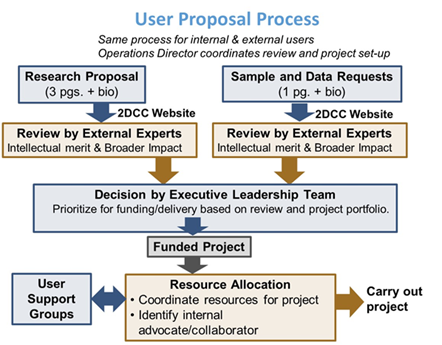Submitting Your Proposal 
- Please carefully review the 2DCC scope and facility capabilities (which will evolve over time as new equipment comes on-line)
- You are encouraged to contact an advocate from the user support group to discuss your ideas before preparing your proposal.

The 2DCC accepts two types of proposals: Research Project and Sample and Data Requests:
- Both proposals types are reviewed by an external user proposal review committee which makes recommendations to the 2DCC executive leadership team.
- For proposal guidelines and further details of the review process, refer to the Proposal Process documentation.
Research projects: These proposals describe synthetic, characterization and/or theory efforts that are performed either by 2DCC staff (off-site user) or by users who come to the facility (on-site user).
Requests for standard samples or data requests: Sample requests for standard samples that are routinely synthesized at the 2DCC or data request proposals for access to growth recipes, characterization and/or simulation data, etc. resulting from 2DCC in-house research efforts.
Current Available Thin-Film Sample Currently Available Bulk Samples
Proposals of all types carry no user fees for academic and government users, so long as the work is non-proprietary (i.e., published in the scientific literature and not kept confidential for commercial reasons). Industrial users are charged a fee based on cost-recovery (e.g., materials and supplies, personnel time, equipment maintenance, etc).
If you have further questions about the 2DCC scope or capabilities, we encourage you to contact a member of a user support group prior to submitting your proposal. Training users in synthesis is part of our mission, and a “sliding scale” of on-site oversight and mentoring is integrated into the user experience.
As a community of 2D synthesis researchers, our shared goal in accepting user proposals is to generate a broad range of the most scientifically compelling proposals, encouraging and facilitating high-quality submissions from a diverse user base.